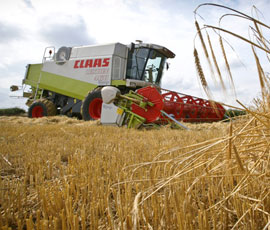Harvest round-up: The divide continues

Harvest is reaching an end in Eastern England, but in the West farmers are still battling to catch up following the wet summer.
In Essex, harvest had produced some very mixed results at Woodhatch Farming, Epping, said farm manager Gareth Wyn-Evans.
“Tipple spring barley was combined last night (3 September), yielding a measly 3.5t/ha at 13% moisture.
“However, on the plus side, Florentine winter barley was combined on 17 August at 15% moisture, and yielded 8.43t/ha with 4t/ha of straw.”
Further north, Eddie and Stuart Baker finished combining about 10 days ago at Ivy House Farm, Laxfield, Suffolk, and had now drilled about half their oilseed rape.
“We’ve been very fortunate with the weather – most people have been finished for about a week, although there are still bits and pieces left to do,” said Stuart.
“However, it’s been a very disappointing harvest, mainly because expectations were so high. The potential was astonishing, but there was just nothing there.”
In Shropshire, Bruce Udale was busy combining today at Eyton House Farm, Telford, and was very disappointed with yields.
“We’re battling on, but the wheat yields are pretty damn dreadful in Shropshire,” he said. “Yields are at least 2.5t/ha down, and there’s a lot left to cut.”
According to HGCA trial results, winter wheat yields were 0.8t/ha below the five-year mean, with treated yields averaging 9.63t/ha so far.
Preliminary quality results showed that bushel weights were 8% below the three-year average, and among the lowest on record at 71.9kg/hl.
“However, with only 40% of GB wheat harvested, the estimates are focussed on South-East and Eastern regions, where drier weather has allowed progress,” said senior analyst Charlotte Garbutt.
The variability in wheat yields and quality this year had been unprecedented – but Nick Tapp, head of agri-business at Bidwells had some idea of what was behind crop failures and successes.
“The wheat harvest in 2012 will be remembered by much of the industry as the most varied, confused and unpredictable for many years,” he said.
Although some failures were purely down to variety; soil type, rainfall, drilling date, and fungicide programmes had all played their part in determining wheat yields and quality, he added.

